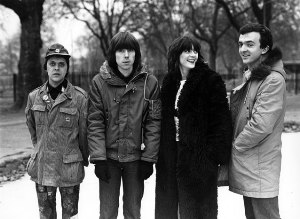You realise – by virtue of being slapped in the face with the evidence – what a great, strange dance band they were
You realise – by virtue of being slapped in the face with the evidence – what a great, strange dance band they were

http://www.industrial-records.com http:www.konkurrent.nl
Where to start with Throbbing Gristle? They are not the easiest of acts to accommodate – it’s taken me a fair number of years since I first stumbled across (and then quickly ran away from) them in the mid/late 80s and certainly these two re-releases aren’t really soft introductions to their work, but both the Second and Third Annual Report warrant your attention. It’s very easy to draw pithy conclusions about them which serve the music an enormous disservice, so let’s try not to here.
In many ways TG’s work is like a marsh light which disappears as you approach it apprehensively through a fog. As such – just like with marsh lights – it’s easy to create myths and leave it at that. A lot of what we read or hear about TG is based on other considerations or pale imitations rather than their actual output.
There’s all the confrontational stuff – injecting testicles with ink on stage – the tough, shocking imagery and exhibitions… and now all the well-deserved plaudits as giants of industrial music which sometimes can make their music distant in a different way. It’s all true at some level of course, the Prostitution exhibition, sex changes… and listening to the versions of Slug Bait at the ICA & Brighton or Hamburger Lady shows they are still shocking in their lyrical content – but anyone can fill a review with all of that and not really get to what’s left with us now, these CD rereleases.
So listening now, some 34 or so years after these LPs were originally released one thing strikes this listener much, much harder than before. These records are as punk as fuck, in a number of ways. Not academic or playful, or “artistic”. Just punk in a way that the owners of Sex could never fathom, or attempt to describe despite their dalliances with the genre.
And innovative, but in a manner that is uniquely theirs. There’s none of the cool of musique concrète or the smug “Beatnikery” of, say, Terry Riley. Neither do they have the forward-thinking romanticism and social “sturm und drang” that is (for me at least) indelibly part of German music of the late sixties and early seventies: though you can hear superficial similarities with some Kraut electro noiseniks (T-Dream, Kluster/Cluster, Schnitzler or Guru Guru being the most obvious); especially with the COUM soundtrack – After Cease to Exist or, say, AB/7A on the 3rd AR. But on the whole there’s a different Muse on display. “Trash” says the anonymous Brighton deejay on the 2nd AR (albeit in response to an audience’s reaction to TG) and trash is what a lot of people would have thought. You realise – by virtue of being slapped in the face with the evidence – what a great, strange dance band they were: the uncompromising, gritty singles United / Zyklon B Zombie and Five Knuckle Shuffle / We Hate You Little Girls must have pricked certain ears over in Sheffield (Mr. Newton’s perhaps) whereas Industrial Muzak and Dead on Arrival create some kind of stentorian funk drill, smashing all before it.
But for all this pleasant reflection in retrospect, you can’t escape the feeling that TG’s world is a murky and nihilistic one, often displaying a violent, inky despair similar that of Blake at his most doom-mongering: a reflection that brings me to another thing. Sitting here in Holland whilst listening to these LPs I’d wager that there’s nowhere else that this record could be made other than urban Britain. It’s such literate, theatrical music. You can also say that these records can be seen as the soundtrack of their times: the arse end of the seventies, a period overshadowed and forgotten; (especially when set against the strife and unhappiness unleashed by the destroyer demon/goddess Brenda) but still a period of unrest, piss-poor living and social standards and a feeling of general malaise and poverty – set against the fall out of that confident shiny 60s idealism. Stuff like No Two Ways, Last Exit, Zyklon B Zombie, or Hit By a Rock are soundtracks to a world that did have something of Clockwork Orange or High Rise about it. But it’s not music that is irretrievably set in time: there’s no denying their influence on an army of young acts this last ten years or so…
So yes, in conclusion not easy, at times pretty queasy but with patience you’ll come to realise just how brilliant these records are.
